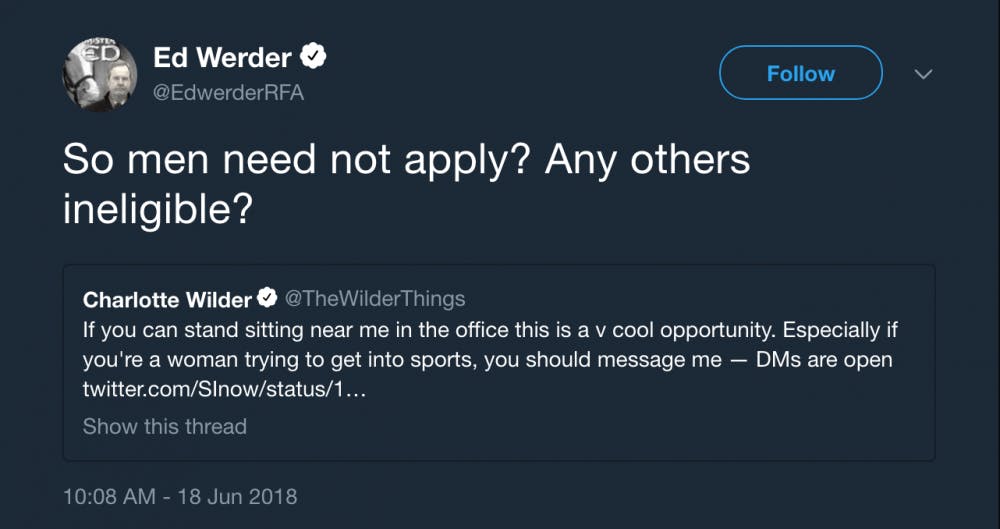“So men need not apply?” Werder replied. “Any others ineligible?”
After the initial comment, he fired off a series of tweets in defense of male candidates, later replying to another female sportswriter, ESPN's Mina Kimes, saying, “Read her original post as an aspiring young male sportswriter and tell me she’s not disqualifying you from getting the job.”
As a young journalist who fits the bill of an "aspiring young male sportswriter," I can say that I don't need Werder to defend me. By making it about us, the ones who already have a clear path to getting to the table, he distracts away from the real issue at hand.
So why is it a problem to defend people like me? Because the last time I checked, we weren't at a shortage of perspectives from goofy white kids. But we are lacking in female voices and voices from people of color.
Wilder didn't make me feel left out, but plenty of better writers than me are being left out of this industry and passed over in jobs they deserve to be holding. And plenty of sports fans and aspiring writers are growing up without being able to read or watch the work of someone who looks like them.
So let’s not make it about us, Ed. Let's make it about the real problem and what should be done about it. Wilder, as her words back up, in no way attempted to exclude male candidates.
"Oh WOW you're right, Ed,” Wilder tweeted back to Werder after his initial comments, “sorry for attempting to make sports media more than 10 percent female, my bad.”
Even if she was trying to discourage someone like me from applying, that would be so small an issue compared to the way female reporters are treated on a daily basis.
Incidents like last summer's debacle between Carolina Panthers quarterback Cam Newton and Charlotte Observer beat writer Jourdan Rodrigue are an example of the just how disrespected women are as they navigate this male-dominated industry. The mountain of white folks bombarding athletes with questions every day in locker rooms — even in sports dominated by people of color — shows how much progress is left in racial representation in journalism.
It doesn’t take an athlete to make a good sportswriter, nor does it take a male reporter or a white writer of the same gender to be good at sports coverage. So we have a lot of work to do.
Women and minority writers haven't had opportunities in this career very long. After all, it was only 40 years ago in 1978 that baseball beat writer Melissa Ludtke successfully sued for the right to enter the locker room just to do her job after the games like her male counterparts could. And it was even more recently when people like Stuart Scott began blazing a trail for black journalists and began to gear broadcasts toward black audiences and black culture.
To get the day's news and headlines in your inbox each morning, sign up for our email newsletters.
These voices Wilder was encouraging to apply haven't been a part of the conversation very long at all.
But in criticizing Werder, I can't help but note the DTH's own place in this issue. Last semester, male reporters on our sports desk outnumbered female ones by a 3:1 ratio — though UNC and the DTH have female-heavy student populations. With 21 male writers and only seven of the opposite gender, we can’t pretend to be without our own room for improvement.
We could desperately use perspective from women and people of color on our desk — to make up the gap that plagues student media and the larger industry all over the country. It's easy to write about sports, but hard to write about it in an interesting way. We need fresh new world views to spice up the mundane of game stories — and to chase after new angles we never could have thought about before.
So I’ll end my column here with an open invitation to all of you. Aspiring female reporters, people of color and fellow goofy white dudes: we would love to have all of you and your perspectives as a part of our team. And to the white guys in particular, who look like me, don't feel threatened to have others, who matter too, included.
There should be an equal place for all of you here, because that's where the change can start. Werder's misguided diatribe could, if nothing else, remind us of that.
So don't forget: Your perspective matters, and should be valued, no matter who you are. Don't let anyone tell you otherwise.
@_JACKF54_
@DTHSports | sports@dailytarheel.com



